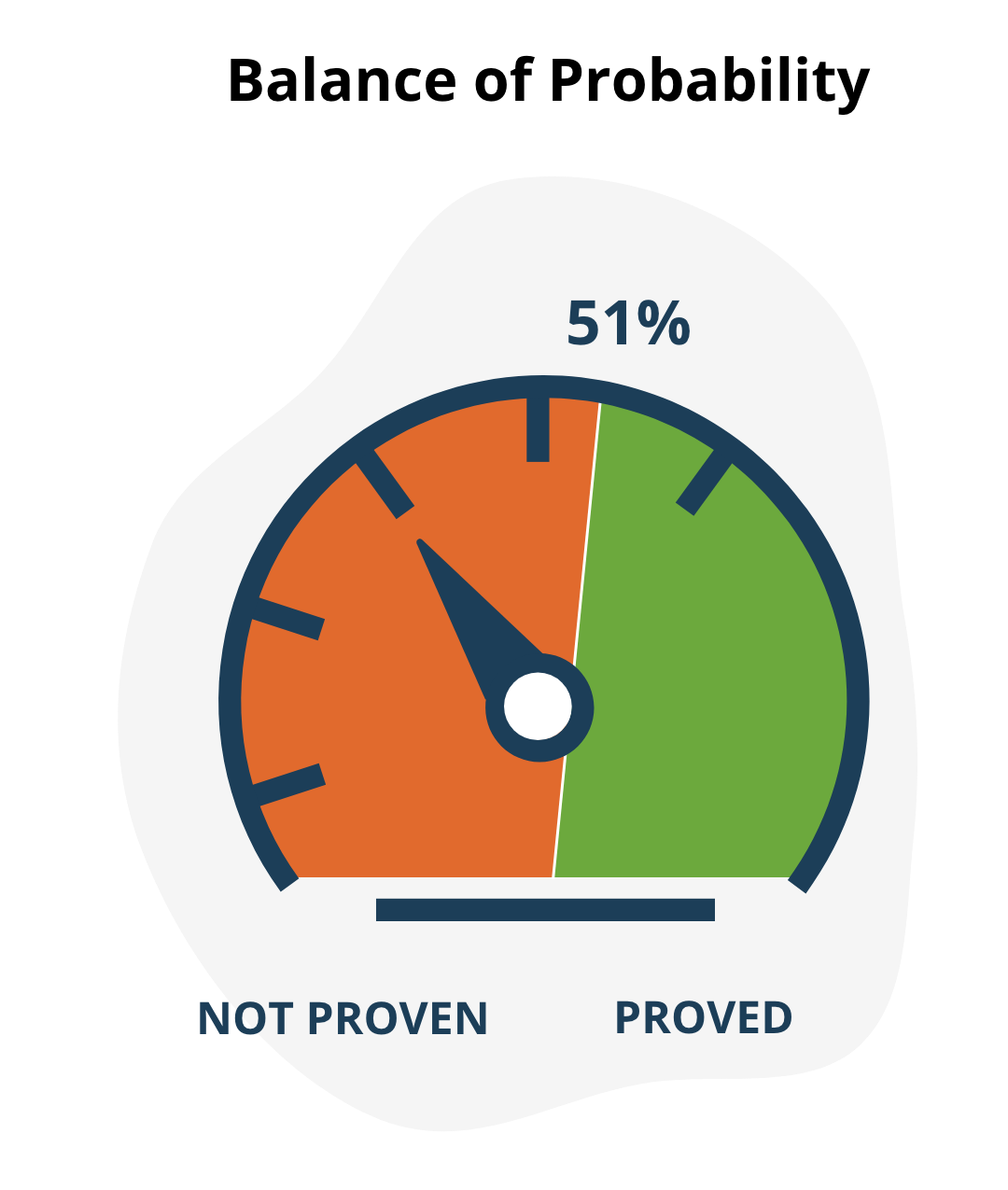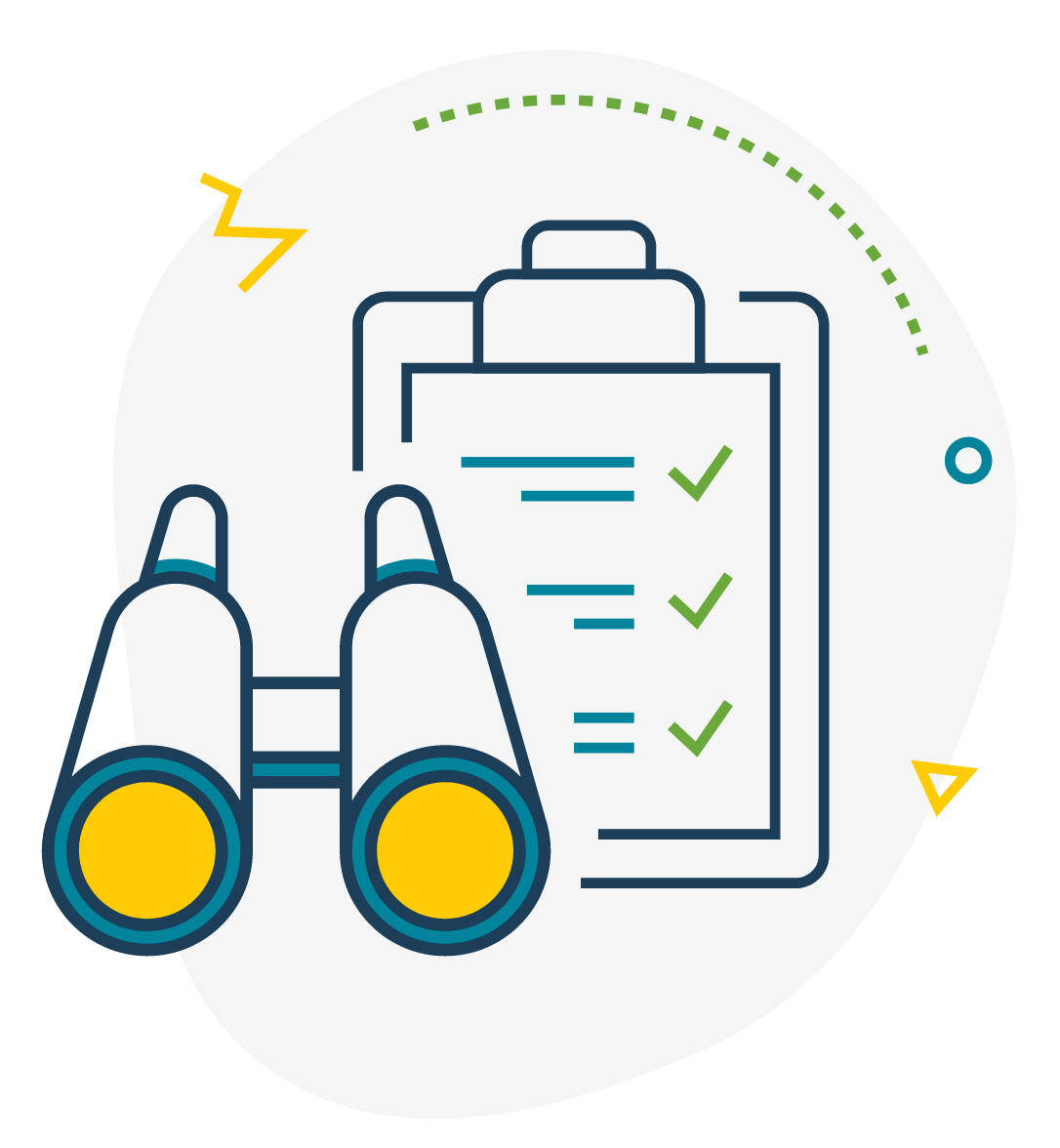Evidence


Judges make decisions based on the relevant evidence presented to them at trial. It is your job to present that evidence. The burden of proving the claim is on the claimant. If you made the claim or counterclaim, you will need to prove your case on a balance of probabilities, which means you’ll have to show that it is more likely than not that the facts happened the way you say. If you are the defendant you will try to show that the claimant has not proven their case on a balance of probabilities.


Key Term
Judges will only consider evidence that is relevant to the case. Relevant evidence will help prove part of your claim. For example, if you are trying to show that a repair person messed up fixing your washing machine and caused water damage, it would be relevant to show pictures of the damage and describe the state of the washing machine before he worked on it. What he was wearing or that he was rude are probably not relevant
Generally speaking, there are three ways you may wish to present evidence in a small claims case. Through:
- Personally testifying (being a witness at your own trial)
- Witnesses
- Documents -contacts, photos, videos, reports etc
Bringing in real objects (not just photographs of them) as evidence is also possible, though not as common in small claims cases.

DIY Tools
Fill out your own Evidence Inventory Worksheet to organize your evidence
Testifying in Your Own Case
It is very likely that you will have to testify in your own case. This is your chance to tell your story. Only what you say under oath counts as evidence. Your questions to a witness are not evidence, only the witness’ answers are. If you don’t have a lawyer, you won’t have anyone asking you questions until cross examination (unless the judge has questions). In this case you will simply tell your story. Testifying can be stressful and it is easy to skip important facts. To help you tell a coherent story and remember all the important information you want to cover:
- Prepare an outline of what you want to say
- Check off important facts as you say them
- Note the documents you want to introduce and when
Remember that if you give evidence, the other party will likely ask you questions . They will challenge your evidence and maybe your credibility. Think about what they might ask you and prepare. Remember to keep calm even if they are trying to provoke you. Present information in a factual, businesslike manner.
Witnesses

A witness has direct knowledge about an issue in the case. Direct knowledge means that they did not hear it from someone else. Pick the witnesses who can give the best evidence on a topic. It is better to have one strong witness on a subject, rather than multiple witnesses who only have a vague recollection of events.
Travelling expenses must be offered when the witness is attending in person or if the witness is attending by another method, they must be offered reasonable estimated costs associated with that attendance method.
Trials are in person by default, but a party or a witness may make an application to change a witness’s method of appearance under Rule 16(7.2), which provides authority for a judge to make an order without a hearing.
Choosing Witnesses
Think about the evidence you want to present or what it is you want to prove. Then consider who can present that evidence. Is there an eyewitness to the events that’s needed? Is there an expert that needs to prove a medical condition or to verify a repair estimate?
When choosing a witness it is important to find one that will be credible, trustworthy and reliable.
The judge will be looking for:
- How consistent the witness’s testimony is with other evidence
- Any contradictions in the witness’ own testimony
- Has the witness been shown to be untruthful in their evidence
- Do they seem reasonable in their assessment of the facts
- How reliable is the witness
With a few exceptions (see below Expert Witnesses and Estimates), witnesses have to come to court and give their evidence in person. You shouldn’t assume you can rely on written statements. A witness may be able to give testimony through an affidavit (a sworn written statement) if:
- A judge ordered that the witness may provide evidence in an affidavit after an application
- The parties both agree, as does the trial judge

Key Term
The judge at your settlement or trial conference will probably give you instructions on what to share with the other party. This may include a list of witnesses you plan on calling and a summary of their expected evidence. This is called a will say and should give the other party a clear indication of what the witness will testify to and what their testimony will be

Read the Rules
Preparing Your Witness
If your case goes all the way to trial, you should prepare your witnesses for attending court and testifying. You can prepare your witnesses by going over the questions you plan on asking and writing down their responses. Do not influence or coach their responses. Do not tell them what to say. If you influence the witness their evidence might not be believed or considered by the court. Witnesses are there to tell the court what they know, not what you wish they would say.
When deciding what questions to ask your witness consider:
- What points do you want them to make?
- What documents do you want them to present?
- What questions will get them to the points you want to make?
For example: You (the claimant) are calling your employer in a personal injury case.
Point: You missed work due to the injury
Question: How much time did I miss from work? What reason did I give for needing time off?
Point: Claimant hasn’t been able to perform heavy lifting duties since the injury.
Question: What kind of lifting am I required to do for my job?
Question: Before the accident was I able to perform these duties?
Question: Has there been a change since the accident? Please describe?

DIY Tools
Summoning Witnesses
If you are not sure that a witness will appear in court on the day of the trial, you can issue a Summons to Witness. If a witness receives a summons they must attend court on the date required and bring any documents required by the summons or the judge could issue a warrant for their arrest. It isn’t always necessary to summon a witness, especially if you know the witness will attend voluntarily.
The person served with the summons may apply to cancel the summons if they are not required or it is a hardship for them to attend, or they may apply to vary a summons to allow them to attend by another method of attendance.

Find the Form
Expert Witness
Unlike most witnesses, an expert witness is allowed to give their opinion as evidence on certain topics. An expert is someone who has specialized knowledge on a topic. For example, you might want to ask questions of a doctor to explain the extent of the personal injury, or a certified mechanic to describe car repairs needed. Experts can be very expensive so carefully consider if you need them to prove your case. Experts are allowed if they are necessary for the court to understand the issues or they can provide useful context to difficult evidence.
There are special rules about expert evidence. It is only allowed if
- The other parties are given advance notice
- The other parties are given a summary of the expert’s evidence (usually in a report)
- The judge allows the expert by accepting them as qualified experts
Expert Reports should include:
- The resume or qualifications of the expert
- A brief summary of the facts of the case
- The opinion or conclusion
- Reasons for the conclusion
You may be able to introduce the expert evidence without actually calling the expert to testify in person, which could save you a lot of money. To avoid calling the expert in person, the other party might agree to have the report entered as evidence.
If the other party wants to question the expert they must give you 14 days notice. If this happens, the expert would have to come to court to testify. It will be at your expense at least to begin with. If the judge finds that it was unnecessary to call the expert in to testify, the party who called them for cross examination may be made to pay the expert’s fees.

Read the Rules
Estimates
You do not need to call the person who provided you an estimate or quote as a witness. For example you may want to get an estimate for repair costs or get an estimate of the value of property that was damaged.
If you want to present this as evidence you need to:
- Get the estimate in writing
- Get more than one estimate
- Serve it on the other party 14 days before trial
- Bring the written estimate to your trial

Read the Rules

Documents
It is a good idea to keep all your contracts organized, take pictures of any damage or injury, and to get agreements and conversations in writing because these can be used as evidence. See Staying Organized for tips. Document evidence includes: letters, photographs, contracts, maps, invoices, receipts emails and texts, etc.
Similar to witnesses, think about what you are trying to prove and if any document evidence will help you prove it. For example: You want to prove the repair cost damages were $9,000. You can provide an estimate for the repairs or receipts for the repair work you had done.
Documents must be introduced through a witness (including you). The witness will have to identify the document as authentic or unaltered. The witness who identifies the document is usually the person who created it. For example you may need to confirm that you took a photo of the property damage. You and the other party can agree to introduce the document without needing a witness. See Introducing Evidence.
Document evidence should be the original document when possible. You can make an agreement with the other party not to use the original document, but if not, be prepared to explain why it is not possible to get the original document.
Remember, even if you have an agreement, the judge is ultimately the one who decides if a document is allowed.

Learn More
Getting Ready for Court from the Government of BC
Understanding a Small Claims Court Trial from the Provincial Court







